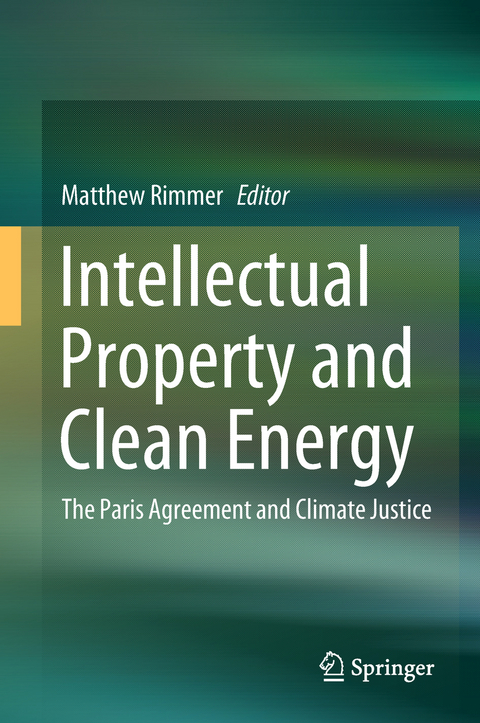
Intellectual Property and Clean Energy
Springer Verlag, Singapore
978-981-13-2154-2 (ISBN)
Matthew Rimmer is Professor in Intellectual Property and Innovation Law at the Faculty of Law, Queensland University of Technology (QUT), Australia. He is a leader of the QUT Intellectual Property and Innovation Law research program, a member of the QUT Digital Media Research Centre the QUT Australian Centre for Health Law Research, and the QUT International Law and Global Governance Research Program. He has published widely on copyright law and information technology, patent law and biotechnology, access to medicines, plain packaging of tobacco products, intellectual property and climate change, and indigenous intellectual property. His current research interests include: intellectual property, the creative industries, and 3D printing; intellectual property and public health; and intellectual property and trade, looking at the Trans-Pacific Partnership, the Trans-Atlantic Trade and Investment Partnership, and the Trade in Services Agreement.
Part I: International Law.- 1. The Paris Agreement: Intellectual Property, Technology Transfer and Climate Change.- 2. The Paris Agreement, Climate Finance and Transparency: Charting the Path to Equity.- 3. The Paris Agreement: Development, the North-South Divide and Human Rights.- 4. Climate Change and Human Rights: Intellectual Property Challenges and Opportunities.- Part II: Patent Law.- 5. Intergenerational Justice: a Framework for Addressing Intellectual Property Rights and Climate Change.- 6. Management of Intellectual Property in Australia's Clean Technology Sector: Challenges and Opportunities in an Uncertain Regulatory Environment.- 7. Intellectual Property, Climate Change and Technology Transfer in South Asia.- 8. Intellectual Ventures: Patent Law, Climate Change, and Geoengineering.- Part III: Trademark Law and Related Rights.- 9. Trademark Goodwill and Green Global Value Networks.- 10. This Ain’t Your Daddy’s Greenwashing: An Assessment of the American Petroleum Institute’s Power Past Impossible Campaign.- 11. The Power of Visual Appeal: Designs Law and Clean Energy.- 12. Key Change: The Role of the Creative Industries in Climate Change Action.- Part IV: Privacy and Trade Secrets.- 13. Environmental Sousveillance, Citizen Science and Smart Grids.- 14. Promoting and Protecting Clean Energy Innovation Through The Trade Secrets Regime: Issues and Implications.- Part V: Open Innovation.- 15. Energy Democracy, Renewables and the Paris Agreement.- 16. Change Change and Open Data: Information Environmentalism.- 17. Open Government Data in an Age of Growing Hostility Towards Science.- 18. Elon Musk’s Open Innovation: Tesla, Intellectual Property, and Climate Change.- Part VI: Plant Breeders’ Rights, Food Security, Access to Genetic Resources, and Indigenous Knowledge.- 19. Path-breaking or history-repeating? Analysing the Paris Agreement’s research and development paradigm for climate-smart agriculture.-20. Genetic resources, intellectual property and climate change.- 21. Benefit Sharing Under the REDD+ Mechanisms: Implications for Women.- 22. Northern Exposure: Climate Change, Indigenous Rights, and Atmospheric Trust Litigation in Alaska.
| Erscheinungsdatum | 16.10.2018 |
|---|---|
| Zusatzinfo | 6 Illustrations, black and white; XVI, 686 p. 6 illus. |
| Verlagsort | Singapore |
| Sprache | englisch |
| Maße | 155 x 235 mm |
| Themenwelt | Naturwissenschaften ► Biologie ► Ökologie / Naturschutz |
| Recht / Steuern ► EU / Internationales Recht | |
| Recht / Steuern ► Öffentliches Recht ► Umweltrecht | |
| Recht / Steuern ► Privatrecht / Bürgerliches Recht ► Medienrecht | |
| Recht / Steuern ► Wirtschaftsrecht ► Urheberrecht | |
| ISBN-10 | 981-13-2154-X / 981132154X |
| ISBN-13 | 978-981-13-2154-2 / 9789811321542 |
| Zustand | Neuware |
| Haben Sie eine Frage zum Produkt? |
aus dem Bereich


